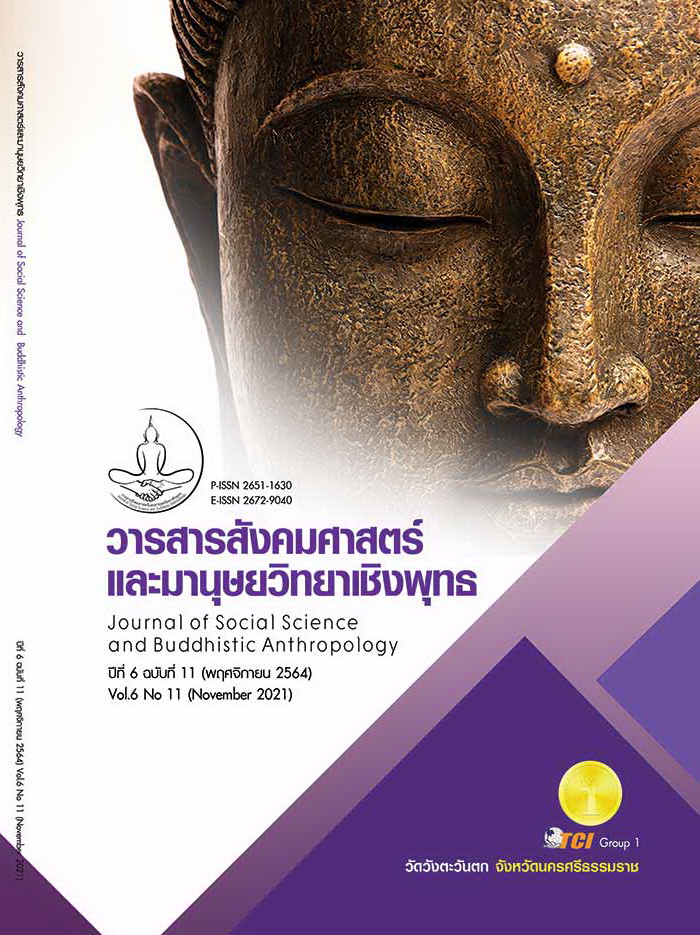INTRODUCE LAWS TO PROTECT THE RIGHTS OF CANNABIS USERS
Keywords:
Cannabis, Addiction, NarcoticAbstract
The objectives of this article were to study the guidelines for drug law development in relation to the protection of rights. If able to develop and solve problems with cannabis users properly Will effectively benefit Thai society in the future by using various cannabis products from the study. Marijuana use is a crime. In which marijuana use is not an act that is harmful to society, it is an act of harming the individual's body, so there is no violent crime against society. Therefore, there is no need for criminal penalties because it would inflate the criminal penalties as it happened. Overcrowded prisoners or accused must go to justice unnecessarily. But today, there are still criminal offenses and criminal penalties, where the designation of "criminal offenses" is of paramount importance. Affecting the rights and freedoms of the people, Therefore, the determination of criminal offenses should be based on the theory of criminal penalties and must be done sparingly. Therefore, it shows the inconsistency with the current human changes towards cannabis, especially the use of cannabis in various forms if in the future the development of cannabis is more open. There will be various issues. Related to marijuana use is inevitable. For this reason, Thai cannabis laws need to be studied with foreign countries. This is to find ways to develop laws on the protection of marijuana users' rights. Criminal laws are not applied to marijuana use, and there are measures regarding the safety of marijuana users. as a guideline for the development of drug laws on the protection of the rights of cannabis users in Thailand
References
เกรียงไกร เจริญธนาวัฒน์. (2556). หลักพื้นฐานกฎหมายมหาชน. (พิมพ์ครั้งที่ 2). กรุงเทพมหานคร: วิญญูชน.
คณิต ณ นคร. (2551). กฎหมายอาญาภาคทั่วไป. (พิมพ์ครั้งที่ 3). กรุงเทพมหานคร: วิญญูชน.
ธิติ มีแต้ม. (2562). เมื่อกัญชาแคนาดาไฟเขียว : เบื้องหลังและคำแนะนำจาก ดร.เจอร์เกน ไรห์ม นักวิทยาศาสตร์อาวุโส. เรียกใช้เมื่อ 31 พฤษภาคม 2563 จาก https://www.the101. world/cannabis-canada-experience/Canada
บีบีซี. (2561). แคนาดาผ่านกฎหมายกัญชาเพื่อนันทนาการแล้ว. เรียกใช้เมื่อ 30 พฤษภาคม 2563 จาก https://www.bbc.com/thai/international-44544159
พระราชบัญญัติยาเสพติดให้โทษ (ฉบับที่ 7). (2562). ราชกิจจานุเบกษา เล่ม 136 ตอนที่ 19 ก หน้า 1 (18 กุมภาพันธ์ 2562).
Daily News. (2012). Amsterdam ditches controversial 'weed pass' law. Retrieved January 20, 2564, from https://www.nydailynews.com/life-style/health/ amsterdam-ditches-controversial-weed-pass-law-article-1.120 5634
European Monitoring Centre on Drugs and Drug Addiction. (2013). Insights into aspects of the EU illicit drugs market: summaries and key findings. Luxembourg: Publications Office of the European Union.
Frida Ghitis. (2013). Amsterdam for tourists: What's legal? Retrieved July 20, 2563, from https://edition.cnn.com/travel/article/amsterdam-travel-legal-parameters
Government of Canada. (2018). Cannabis Act. Retrieved May 30, 2020, from https:// laws-lois.justice.gc.ca/eng/acts/c-24.5/
Government of the Netherlands. (2020). Drug use and addiction. Retrieved May 28, 2563, from https://www.government.nl/topics/drugs/drug-use-and-addiction -care
Jean-Paul Grund and Joost Breeksema. (2013). Coffee Shops and Compromise: Separated Illicit Drug Markets in the Netherlands. New York: Open Society Foundations.
NBC News. (2007). Alcohol, tobacco among riskiest drugs. Retrieved May 28, 2563, from http://www.nbcnews.com/id/17760130/ns/health-addictions/ t/alcohol-tobacco-make- top-list-risky-drugs/#.X1M3i-fis2w
Niamh, E. et al. (2016). A Quiet Revolution: Drug Decriminalisation Policies in Practice Across the Globe. London: Release Publication.
Robert Mac Coun. (2011). What can we learn from the Dutch cannabis coffeeshop system? Addiction, 11(106), 1899-1910.









